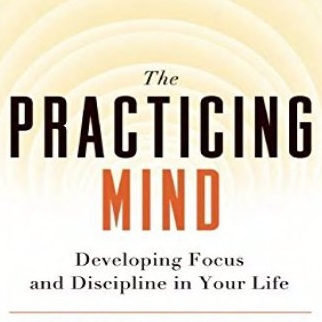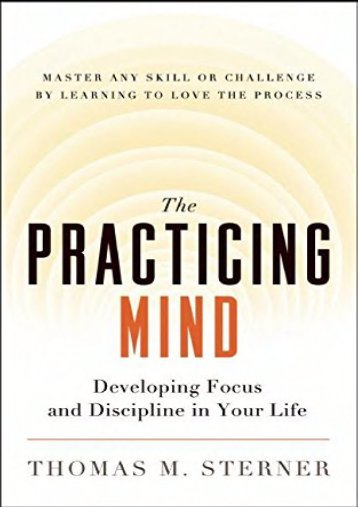I really loved The Practicing Mind : Developing Focus and Discipline in Your Life – Master Any Skill or Challenge by Learning to Love the Process by Thomas M. Sterner. I chose to read this book as it aligned so beautifully to a habit that I am working to establish “Use deliberate daily practice” to help me achieve my goal for 2018.
The first couple of chapters of the book set you up to be able to really understand what practice is and why it is so important. Sterner notes that practice and learning are similar but they are not the same thing. Practice “implies presence of awareness and will”. Learning does not. He goes on to define practice as:
deliberate repetition of a process with the intention of reaching a specific goal
While it can all seem a bit semantic when making definitions like this, I found it valuable. It helped me fully understand the concept of deliberate practice – it is about the process not the product. It is about focusing on the process not the goal we are trying to achieve through the process. If we focus on the process, that is the action we are practicing, then the goal will take care of itself. If however we focus on the goal only, we get impatient. When thinking about the goal we are living in the future, when we are thinking about the process we are living in the present.
As soon as I comprehended what I was reading, it made me realise how important this book would be also for another habit I am working on to “practice detachment”. Deliberate practice requires staying in the process and letting go of our attachment to the “product”.
The beauty of taking this approach is it takes the pressure off, our mind can slow down and focus on just what is doing and this allows us to feel calmer.
For the last few years, I have set a single goal for personal and work life, then set habits that I chose to work on to help me achieve the goal. In Sterner’s terminology the goal is the product and my habits are the process. The goal is the rudder for practice sessions but I don’t need to think about the goal every day to measure my progress. My experience with setting a single goal, is exactly as Sterner states – if I focus on the habits, the goal takes care of itself.
Rules of the practicing mind
Sterner has some key rules of the practicing mind
- Keep process oriented
- Stay in the present
- Have a process goal and an overall goal as the rudder to steer your efforts
- Be deliberate in your actions
- Have an intention about what you want to accomplish and remain aware of this intention.
By adhering to these rules you eliminate the judgement and emotions that can creep in when you are product/end goal focused.
Practice, habits and patience
Habits and practice are interrelated. What we practice will become a habit and practice allows you to intentionally create the habit you want. This awareness lets you think about the habits you are forming in your day to day life and it is liberating to know that you are in control of the habits you set when you stay in the moment.
When we don’t stay in the moment, when we perhaps focus on a goal we are not achieving we can become frustrated with our lack of achievement. Staying present reduces our frustration and allows us to focus more clearly on the task we are doing – we are patient with the process.
If however we become impatient and too attached to our goal, this brings about negative emotions. We may worry, start to feel stressed or a sense of urgency about what we are doing. These are symptoms of not being in the moment and not staying process oriented.
Techniques to shift perspective and gain patience
Sterner shares techniques we can use to shift perspective and gain patience which, he calls the 4 “S” words. They are all interrelated and flow on to each other:
- Simplify – when you work at a specific project or activity, simplify it by breaking it down into sections.
- Small – make the sections small so that they can be achieved with a comfortable amount of concentration
- Short – only ask yourself to focus for a short period of time
- Slow – work at a pace that allows you to pay attention to what you are doing
Equanimity and “DOC”
Sterner highlights the importance of the quality equanimity to live a happy and fulfilled life. He defines equanimity as calmness and even-temperedness and notes:
One of the signs that someone possesses this virtue is that they are undisturbed by the moment-to-moment ups and downs they experience in daily life. Things just don’t seem to bother these people. Why is this? It is because equanimity comes from the art of non-judgment. Non-judgment quiets the internal dialogue of our mind.
Sterner acknowledges that judgements are necessary for life and they require the act of evaluation or comparison. The down side to judgement is that it is not executed with a detached nature. There is emotion involved and emotions hinder our ability to think clearly. Ego is involved in judgement and ego is subjective. To deal better with this judgement we need to learn to become a quiet observer of what is going on:
- observer = objective
- observer = equanimity
- observer = present moment
- observer = tranquility
The observer sounds like someone we all want to be! So how do we become aligned with the observer? Sterner suggests two key tools – meditation and “DOC”. “DOC” stands for:
- Do – this is the action, the doing of the process
- Observe – you are in the moment and concentrating and observing the process unfold without judgement regardless of how successful it is
- Correct – you look at the problem as an observer and correct it and try again without emotion
This technique can be applied to any activity in which you are trying to engage the practicing mind. And it is in the description of DOC that Sterner uses a phrase that has stuck with me and I use frequently:
This is when the fun begins.
When we find ourselves struggling or in a difficult situation, he suggests using a mantra of this is when the fun begins, to help us stay in the process of practicing DOC. I have found it works super well as a trigger for me to switch from thinking negatively about myself to being less judgemental and refocusing back on the process.
The Practicing Mind helped me make some significant changes to my mindset in how I was approaching some daily activities in my life with great success. If you are wanting to work towards something, learn a new activity or want to cope better with the daily demands of family life I can highly recommend the book.
When we make staying focused on the process our real goal, we experience a sense of success in every moment.
You can find my other book reviews here. What are you reading at the moment?
Some of the links contain affiliate links, which means at no extra cost to you, making purchases through them helps support this site. Thank you!


